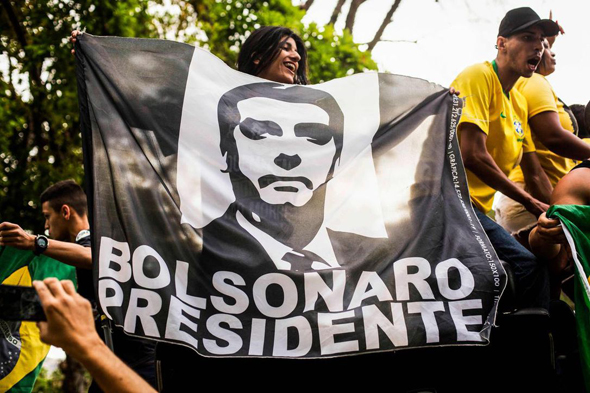The Right Turn of Brazil - By Sameer Guduru
 The Brazil elections this year appears to reflect the populist sentiment that has rocked the developed countries of the West, and has ended up raising concerns.Populism is on the rise all across the globe - be it the results of the US Presidential elections, or Brexit. Or the increased voting share of extreme right-wing parties in Germany and France, coupled with the populist leadership in Poland and Hungary. Populism now seems to have reached South America, with its biggest country likely to elect a far-right candidate Jair Bolsonaro in a polarized election. The closest competitor in terms of voter percentage to Bolsonaro is Haddad, who is regarded to be a centre left political ideologue.
The Brazil elections this year appears to reflect the populist sentiment that has rocked the developed countries of the West, and has ended up raising concerns.Populism is on the rise all across the globe - be it the results of the US Presidential elections, or Brexit. Or the increased voting share of extreme right-wing parties in Germany and France, coupled with the populist leadership in Poland and Hungary. Populism now seems to have reached South America, with its biggest country likely to elect a far-right candidate Jair Bolsonaro in a polarized election. The closest competitor in terms of voter percentage to Bolsonaro is Haddad, who is regarded to be a centre left political ideologue.
The biggest Latin American nation - Brazil, is known for its military dictatorship from the mid 1960's till the mid 1980's. The country of 200 million people is yet again preparing itself to elect a military veteran. Bolsonaro, who was almost fatally stabbed using a knife during his election campaign, is now the front runner in the final round of the Brazilian elections. Dubbed as the "Tropical Trump", the 63-year-old born to Italian immigrants has his own list of controversies. His statements in the past have been homophobic, misogynistic and racist. In fact, he once said with regard to combatting crime from the Favelas (Brazilian slums), that for the death of every policeman 30 people would die from the favelas. This brand of politics and his remarks regarding various groups of people has attracted a large voter base. Bolsonaro portrayed himself as an outsider to the establishment, and proclaimed that his election would mean the fixing of an age-old system that has become corrupt and inefficient.
Bolsonaro has managed to consolidate his voter base by promising to change the status quo. He even managed to attract voters from the centre left Workers Party to vote for him. This is mainly due to the stagnation of the Brazilian economy with very low growth rates and increasing rates of youth employment and job loss. This coincided with extremely corrupt governments and leaders at the centre of Brazilian politics. Bolsonaro, with the promise of bringing the country back on track, has appealed to the larger audience and promises to bring in a sense of discipline among the wider sections of the society and the top leadership. South America's largest economy in terms of GDP needs a resurgence and the people desperate for a change have become Bolsonaro's main voters.
This is of course apart from the conservative Pentecostal Evangelical Christians, who have always supported Bolsonaro's openly expressed views with respect to the LGBTQ community, abortions, etc. In one instance, Bolsonaro commented that if any of his four sons turned out to be gay, he would be happy to see them dead in a road accident. Bolsonaro also has made comments on a fellow MP regarding her physical attractiveness and that he would not consider her to be raped by him. The rhetoric today in Brazil is similar to that of in the United States during President Trumps election campaigning.
Bolsonaro also promised relaxing gun control laws, as well as praised the military dictatorships of the past. He has also termed immigrants from Africa and the middle east as the scum of humanity. In addition to this, Bolsonaro wants to reinstate the death penalty for a crime that was abolished way back in 1889. Following the footsteps of President Trump, Bolsonaro also wants to quit the Paris Climate Deal of 2015.
However, Bolsonaro's candidature is being severely criticized by centre left political parties, Youth organizations, as well as minority race groups. Apart from this, various student groups and youngsters have made their way to the street to prevent Bolsonaro from getting elected as he is set to reduce the public funding for education and scientific research. Many are concerned that the Brazilian Military is likely to play a larger role post Bolsonaro's election and it would probably lead the country back in the direction of a military dictatorship. Some are of the opinion that Brazil is going to suffer immensely under a populist leader like Bolsonaro as it is multicultural and the incidence of hate crimes shall most likely increase. Also, many commentators are worried that unlike the United States which has strong institutions including a solid judiciary, Brazil lacks them. This would most likely result in the institutions being heavily influenced by Bolsonaro.
Perhaps, the biggest humiliation he caused his rivals was by not attending the final debate in the run for the elections, while gaining two percentage points of votes. Many upper and lower middle-class women have voted for Bolsonaro even though he does not support equal pay for women citing that that they get pregnant. Such a strong populist wave in Brazil can only be blamed on the previous governments that have been massively corrupt and have the Brazilian economy in tatters. It is yet to be seen how the policies of the populist regime of the "Tropical Trump" shall shape up after the elections.
Mr. Sameer Guduru is a second-year student of the M.A. (International Studies) course at the Symbiosis School of International Studies.
.png)

.jpg)